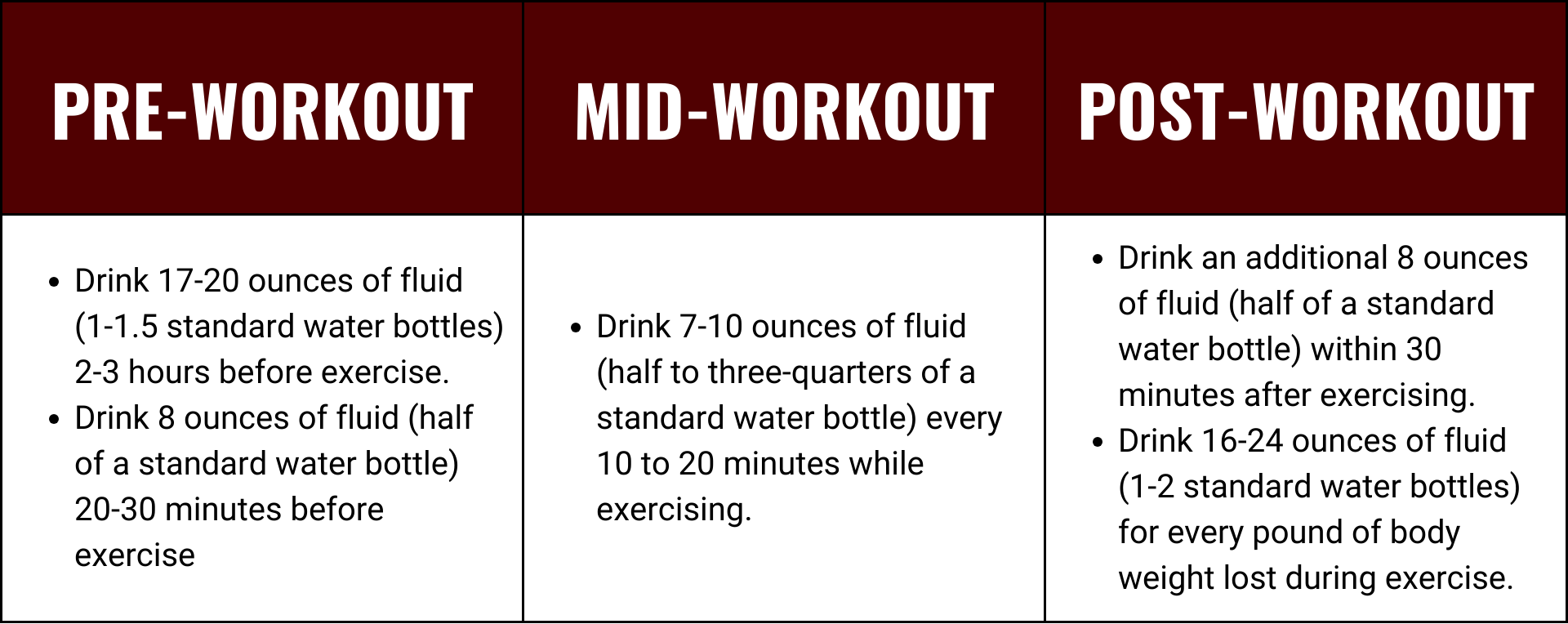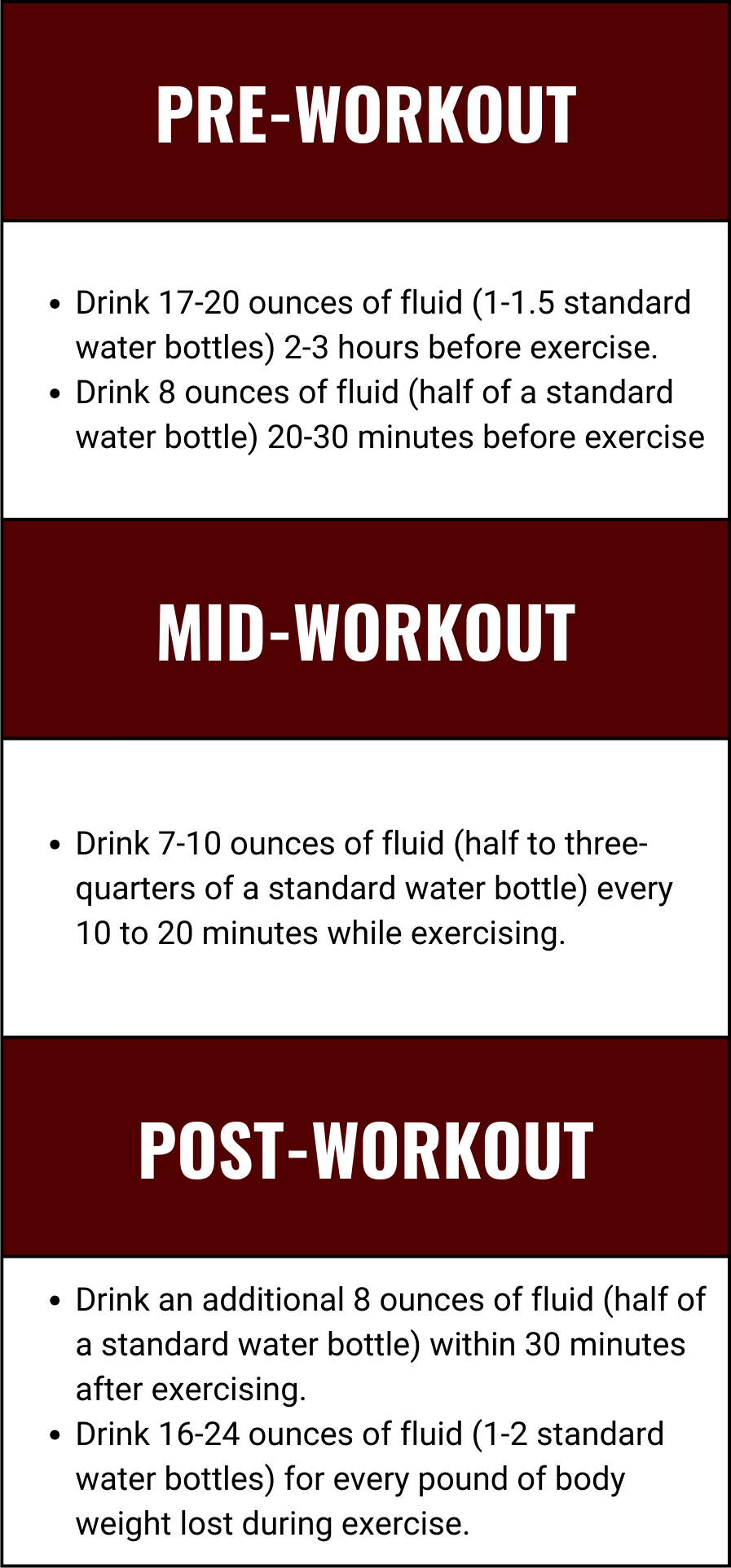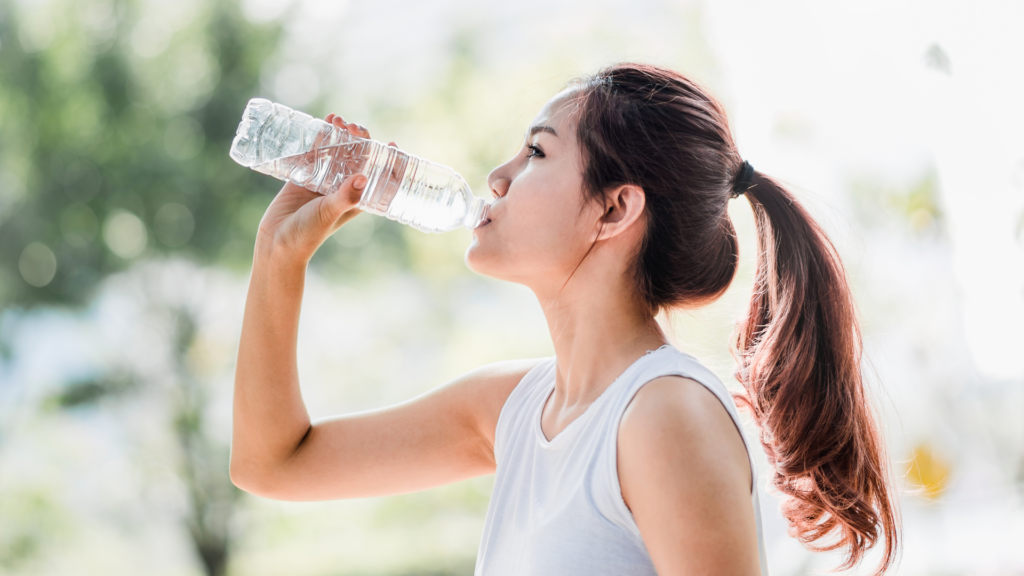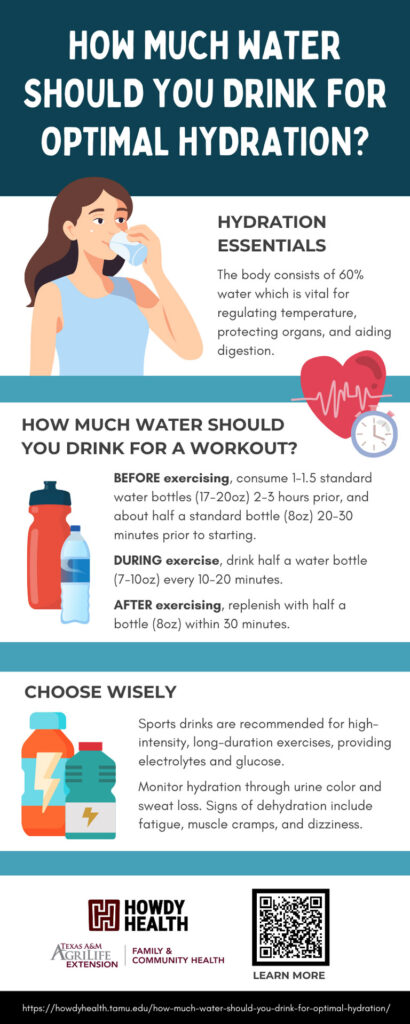The human body is made up of approximately 60% water, making water one of the body’s most essential components.1 For this reason, it’s important for your body to get the right amount of water for optimal hydration.2
Why water?
Water keeps the body healthy and regulated in many ways. To name a few, water:
- Regulates your body temperature
- Lubricates your joints
- Cushions and protects vital organs
- Aids the digestive system
- Helps transport nutrients to give you energy and keep you healthy.1,2
If you’re not properly hydrated, your body can’t perform at its highest level, and you may experience fatigue, muscle cramps, dizziness, or more serious symptoms of dehydration.2
How much water should I drink for a workout?
The American Council on Exercise recommends the following guidelines for staying hydrated:
- Pre-workout
- Drink 17-20 ounces of fluid (1-1.5 standard water bottles) 2-3 hours before exercise.
- Drink 8 ounces of fluid (half of a standard water bottle) 20-30 minutes before exercise
- During workout
- Drink 7-10 ounces of fluid (half to three-quarters of a standard water bottle) every 10 to 20 minutes while exercising.
- Post-workout
- Drink an additional 8 ounces of fluid (half of a standard water bottle) within 30 minutes after exercising.
- Drink 16-24 ounces of fluid (1-2 standard water bottles) for every pound of body weight lost during exercise.1,3 You can figure this out by weighing yourself before and after exercise.
Note: In hot conditions, choose cold water. Cold water is better for both performance gains and keeping you going longer in hot conditions.3


Are sports drinks good for hydration?
For most regular exercisers (those exercising for general fitness and recreation) water is the best choice and all that is needed to hydrate the body. If you’ll be exercising for longer than an hour at a high intensity, then a sports drink that replenishes electrolytes (sodium, potassium, phosphate, magnesium, chloride, calcium, bicarbonate) and glucose (sugar that comes from simple carbohydrates)4 may be helpful.2,5
Choose sports drinks wisely. Read the Nutrition Facts Label and ingredients list. Think in terms of replacing sodium and glucose. Sodium (salt) is the main electrolyte lost in your sweat and is particularly important to help nerves transmit electrical signals to your muscles, including your heart, and to help your body absorb nutrients into its cells.6 Glucose (a form of sugar, not table sugar) is used as fuel for your cells and your body’s main source of energy. Your body breaks down most carbohydrates from the food you eat and converts it to glucose. Glucose can then be used immediately or stored in your muscles and liver (as glycogen) for when your body needs a boost of energy.7
As a guideline, adults exercising vigorously for more than an hour should aim for:
- 200 milligrams of sodium per 16-ounce serving of sports drink (a 12-ounce bottle should have at least 150 milligrams of sodium) for electrolyte replacement.
- 6%-8% total carbohydrate for energy (glucose) replacement.6
Keep in mind, since sports drinks can be high in added sugar and sodium, it’s important to check the label to be sure you’re not consuming multiple servings unnecessarily. Consuming more than 8% carbohydrate concentration will slow the rate of fluid absorption in your body,8 and of course consuming unnecessary calories can cause weight gain. Additionally, some sports drinks may contain caffeine, which can cause a diuretic effect on your body, causing you to urinate more often,2 thus losing more fluid. Sugary drinks, like juice and soda, are not healthy options for staying hydrated.2
Assessing your hydration
Though adequate hydration varies among individuals, two practical ways to assess your hydration level are to check your urine color and sweat loss.
- Urine color: Check the color of your urine first thing in the morning when you wake. Light-colored, pale yellow, or colorless urine is a sign of adequate hydration – you’re likely well-hydrated. Darker yellow or amber-colored urine (the color of apple juice) generally indicates inadequate hydration and may be a sign of dehydration.2,9
- Sweat test: You can assess your sweat loss during exercise by checking your weight before and after your exercise session. Dehydration results when we don’t adequately replace the fluid lost though sweating. Among adults, dehydration that exceeds 2% body weight loss can harm exercise performance.9 So, be sure to drink fluids before activity and replenish them during and after your exercise session to minimize dehydration risk.
Sweat loss
Keep in mind that environmental as well as individual factors can influence sweat loss. The following factors may contribute to increased fluid loss through sweat:
- Higher air temperatures
- Higher workout intensity
- Larger body size
- Male gender
- Longer workouts
- Higher fitness level (Note: When you are more fit, you cool your body through sweat more efficiently than someone whose body is less used to the extra stress. That’s why fluid needs are higher for more highly trained athletes.)9
Signs of dehydration
It’s important to know the signs of dehydration, so that you can take action. Some signs of dehydration include:
- Exhaustion, fatigue, or increased perception of effort
- Muscle cramps
- Lightheadedness
- Dizziness
- Hard, fast heartbeat and/or breathing
- Reduced sweating
- Clammy skin
- Chills
- Dry mouth (and possibly, but not necessarily, intense thirst)
- Nausea and/or vomiting
- Loss of coordination or concentration
- Confusion
- Weakness or fainting.2,6,9,10,11
While minor fatigue, like muscle cramps, or lightheadedness may be resolved by replenishing fluids and cooling down, seek medical help for severe dehydration, like if you or someone with you experiences mental confusion, loss of coordination or concentration, weakness or fainting.2,10 Severe dehydration can cause heat exhaustion and could lead to heat stroke.11
The bottom line
When it comes to hydration, water is the best choice for regular, moderate bouts of exercise. For those participating in vigorous activity for more than an hour, the electrolytes and carbohydrates in a sports drink can help replenish those lost during activity. Be sure not to consume more than needed. You can switch back to water once you’ve replenished your electrolytes and carbohydrates according to guidelines.
Looking for a group activity that can motivate you, your family, friends, coworkers, and community? Join one of our free walking programs.
Infographic
Download the PDF or share the image below to help others learn more about how much water to drink for optimal hydration.
How much water should you drink for optimal hydration? – Infographic (pdf)
- Leon AD, Dalleck LC, Robinson J. Fit facts: Healthy hydration. Fitness & Healthy Lifestyle Blog. American Council on Exercise. Accessed March 18, 2024. https://acewebcontent.azureedge.net/assets/education-resources/lifestyle/fitfacts/pdfs/fitfacts/itemid_173.pdf.
- American Academy of Family Physicians. Hydration for athletes. familydoctor.org. June 2, 2023. Accessed March 18, 2024. https://familydoctor.org/athletes-the-importance-of-good-hydration/.
- American Council on Exercise, Evolution Nutrition Contributor. How hydration affects performance. ACE. Accessed March 18, 2024. https://www.acefitness.org/resources/pros/expert-articles/5397/how-hydration-affects-performance/.
- Cleveland Clinic. Glycogen: What it is & function. Accessed March 18, 2024. https://my.clevelandclinic.org/health/articles/23509-glycogen.
- Harvard University – The Nutrition Source. September 23, 2019. Accessed March 18, 2024. https://www.hsph.harvard.edu/nutritionsource/sports-drinks/
- Johns Hopkins Medicine. Sports and hydration for athletes: Q&A with a Dietitian. October 30, 2023. Accessed March 18, 2024. https://www.hopkinsmedicine.org/health/wellness-and-prevention/nutrition-and-fitness/sports-and-hydration-for-athletes.
- Nemours Foundation. Definition: Glycogen (for teens) Nemours KidsHealth. Accessed March 18, 2024. https://kidshealth.org/en/teens/glycogen.html.
- Doane JM. Hydration guidelines – sports nutrition topics. Accessed March 18, 2024. https://www.nata.org/sites/default/files/hydration-guidelines_handout.pdf.
- Ellis E. Hydrate right. Academy of Nutrition and Dietetics: eatright.org. Accessed March 18, 2024. https://www.eatright.org/fitness/physical-activity/exercise-nutrition/hydrate-right
- National Institutes of Health. Hydrating for health. June 1, 2023. Accessed March 18, 2024. https://newsinhealth.nih.gov/2023/05/hydrating-health.
- Johns Hopkins Medicine. Hydration. Accessed March 18, 2024. https://www.hopkinsmedicine.org/all-childrens-hospital/services/pediatric-sports-medicine/programs-and-services/sports-rehabilitation/athletic-training/getting-ready-for-the-season/hydration.





